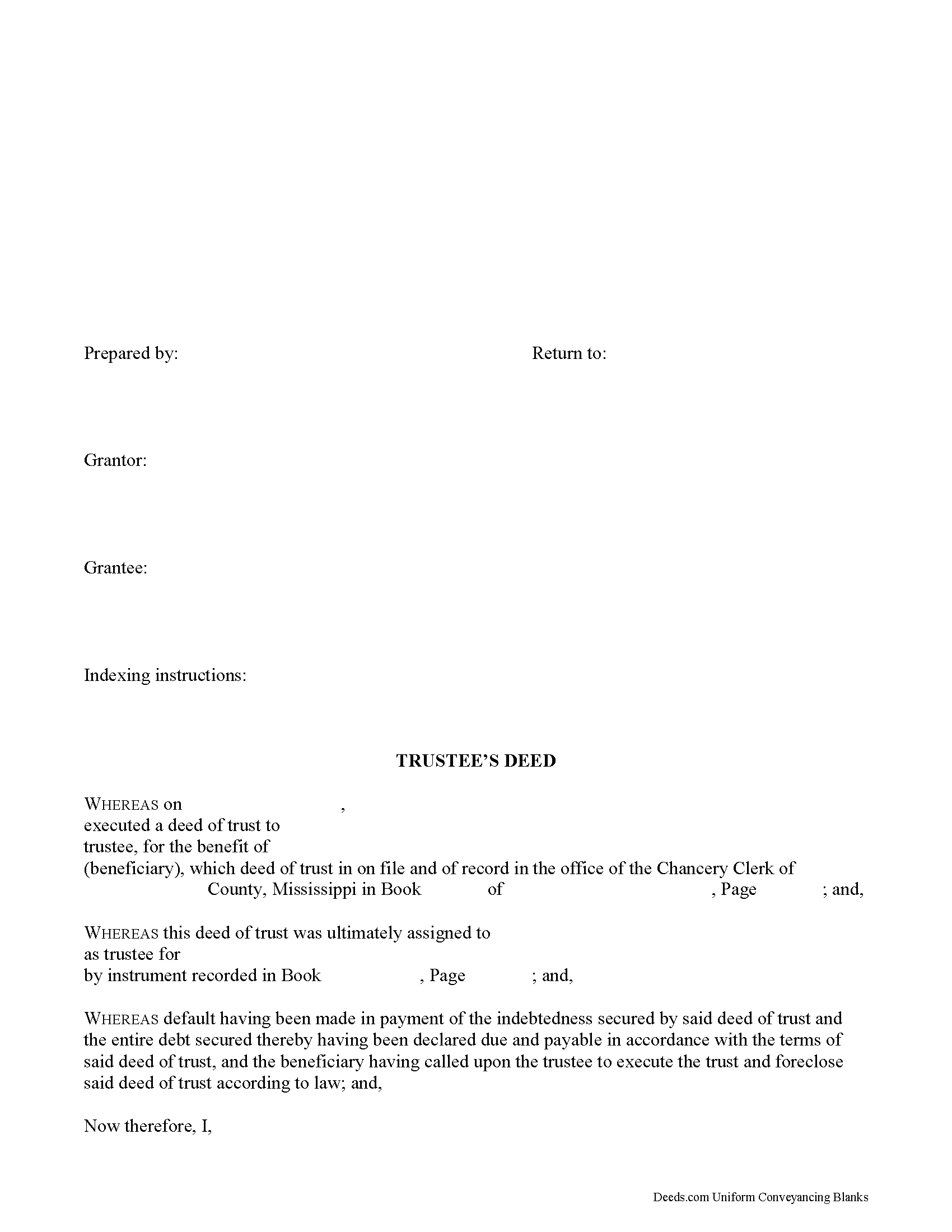Download Mississippi Trustee Deed for Sale of Foreclosed Property Legal Forms

Mississippi Trustee Deed for Sale of Foreclosed Property Overview

The trustee's deed is used to convey real property after foreclosure and sale under a deed of trust. It takes its name from the executing party rather than from the type of warranty the deed contains. After conducting a trustee's sale at public auction, the trustee uses the deed to vest title to the property in the name of the highest bidder.
A deed of trust (alternately called a trust deed or a deed in trust) is a variation of a mortgage whereby a trustee holds legal title to property as security for the repayment of a loan. The borrower, called the trustor or grantor, executes the deed of trust to the trustee for the benefit of the lender, called the beneficiary. The trustee is generally an agent of the beneficiary.
Upon fulfillment of the terms of the deed of trust, the trustee revests the legal title in the name of the borrower (Miss. Code Ann. 89-1-49(1)). If the borrower breaches the conditions of the deed of trust, the beneficiary can instruct the trustee to initiate foreclosure proceedings. In Mississippi, "any deed of trust...may confer on the trustee...the power of sale"; this power must be conferred upon the trustee in the deed of trust in order for him/her to act upon it (Miss. Code Ann. 89-1-63(2)).
Before the trustee can conduct a trustee's sale at public auction, preliminary requirements must be fulfilled under Mississippi law, including the publication of notice of sale in a local newspaper and posting of notice of sale at the county courthouse in the county where the subject property is located (Miss. Code Ann. 89-1-55). The deed then recites that the requirements for the posting of notice of sale under Miss. Code Ann. 89-1-55 have been met with proof of publication sometimes attached as an exhibit to the document.
Upon conclusion of the public auction, the trustee executes a trustee's deed to the highest and best bidder. The trustee conveys only such title as is vested in him/her as trustee under the deed of trust. The form's granting language contains implied covenants of seisin, against encumbrances (except for those named in the deed), and quiet enjoyment (Miss. Code Ann. 89-1-41).
Besides meeting the requirements of form and content for documents affecting real property in Mississippi, the trustee's deed requires the names of all parties to the deed of trust under which the property is being sold, as well as a reference to its place of recording (Miss. Code Ann. 89-1-53). If the trustee conducting the sale and executing the trustee's deed is a substitute trustee, the trustee's deed also requires a reference to the deed of substitution (same statute).
As with all conveyances in Mississippi, the deed requires a legal description of the property as well as indexing instructions. It should recite the name, address, telephone number, and bar number, if applicable, of the person who prepared the document. The trustee's signature must be witnessed in the presence of a notary public before submission for recording in the Office of the Chancery Clerk in the county in which the real property is located.
Consult a lawyer with any questions regarding trustee's deeds in Mississippi, as each situation is unique.
(Mississippi DFS Package includes form, guidelines, and completed example)